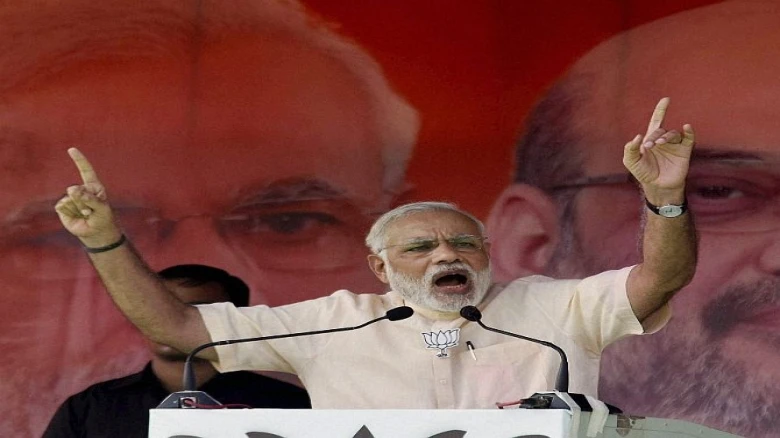Regional

Prime Minister Narendra Modi on Monday accused the opposition of trying to divide the country in the name of caste...
Digital Desk: Prime Minister Narendra Modi on Monday accused the opposition of "trying to divide the country in the name of caste." His comments came just hours after the Bihar government released details of its controversial state-wide caste-based survey, adding fuel to the already heated political discourse in the country. Although the Prime Minister did not explicitly mention the survey or any specific party, his remarks were seen as a direct response to the ongoing political debate surrounding caste-based data.
Speaking in Gwalior, Madhya Pradesh, where state elections are on the horizon, Prime Minister Modi launched a stinging critique of the opposition's track record. He lambasted them for failing to deliver on the promise of development during their time in power and accused them of "playing with the feelings of the poor."
"They played with the emotions of the poor back then... and even today they are playing the same game. Earlier they divided the country in the name of caste... and today they are committing the same sin. Earlier they were guilty of corruption... and today they are even more corrupt," PM Modi said, emphasizing the gravity of dividing society along caste lines.
Prime Minister Modi's comments were widely interpreted as a two-pronged attack aimed at Bihar's ruling Janata Dal (United), a former BJP ally, and the Congress, which serves as its primary opposition in Madhya Pradesh. The Congress has vowed to conduct a similar caste-based survey if it returns to power after elections later this year.
Rahul Gandhi, leader of the Congress party, had earlier voiced his support for a caste-based census, stating, "After coming to power, the first thing we will do is to go for a caste-based census to know the exact number of OBCs..." Reacting to the Bihar government's report, Gandhi reiterated the Congress's demand for a national caste census, citing its importance in formulating social empowerment programs and promoting social justice.
The pressure on the Bharatiya Janata Party (BJP) to conduct a national caste census is likely to intensify following the release of the Bihar government's report, which revealed that around 63 percent of the state's population belongs to backward classes, while over 20 percent are from Scheduled Castes or Tribes. The report also highlighted that the 'general population,' which includes the so-called upper classes that dominated Bihar politics until the Mandal report, constitutes about 15.5 percent of the state's population.
Released just months ahead of a general election in Bihar, a state with 40 parliamentary seats, the report is expected to heighten tensions as other states consider similar caste-based surveys and the opposition demands a nationwide count. It is becoming increasingly apparent that the issue of caste-based data may become a prominent electoral issue in the run-up to the 2024 general elections.
However, the BJP's state and national leaders have not always been in complete alignment on this issue. The party's state unit leader, Samrat Choudhary, indicated that they would first need to "study the methodology" before taking a firm stance. Sushil Kumar Modi, the former Deputy Chief Minister of Bihar, noted that it was the BJP-JDU Bihar government before Nitish Kumar left the alliance, that initially resolved to conduct a caste survey.
Nitish Kumar, Bihar's Chief Minister, along with his deputy Tejashwi Yadav and RJD boss Lalu Prasad Yadav, hailed the release of the caste-based survey report as a "watershed" moment. Kumar also expressed his intention to convene a meeting of all political parties in the Assembly, including the Prime Minister's BJP, to discuss the next steps.
The last time a caste-based headcount was conducted in India was in 1931. In 2011, the Congress-led UPA central government conducted a socio-economic caste census, but data pertaining to castes was never published. Bihar now becomes the first state to complete and release the results of such an exercise, potentially setting a precedent for other states.
While Karnataka conducted a caste-based survey in 2014 but did not make the data public, Telangana announced one for 2021 that was ultimately not carried out. Odisha also declared its intention to conduct a caste-based survey this year, indicating that the issue of caste data remains a contentious and complex matter in Indian politics.
Leave A Comment